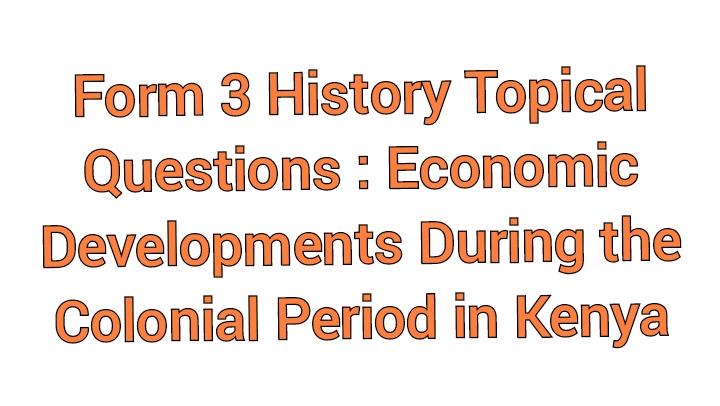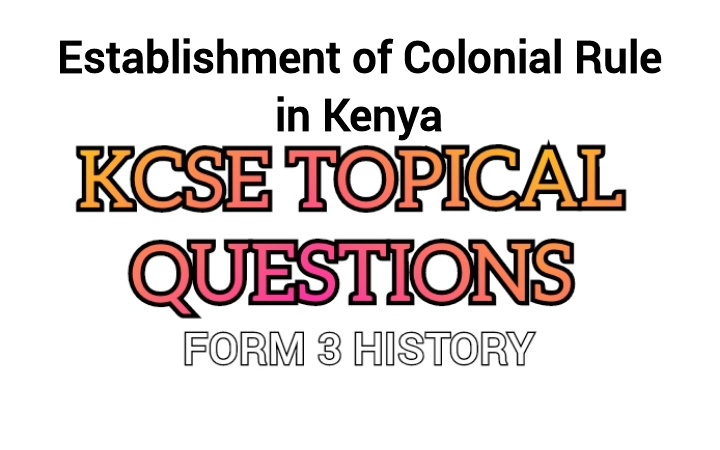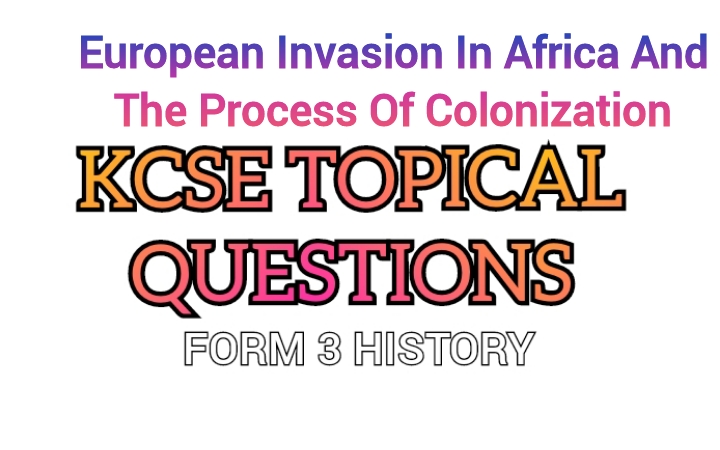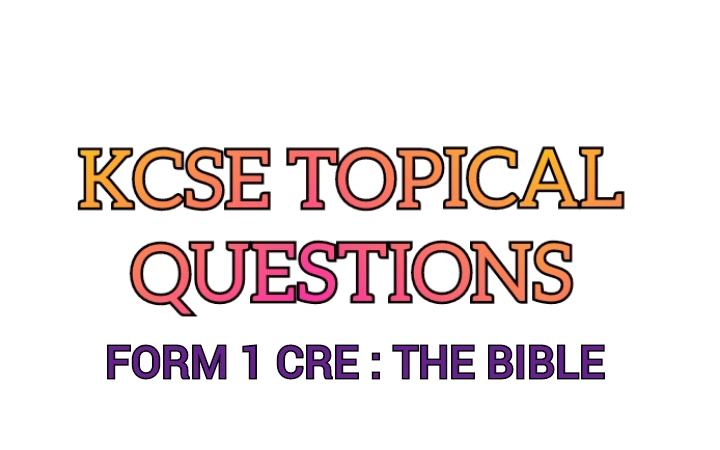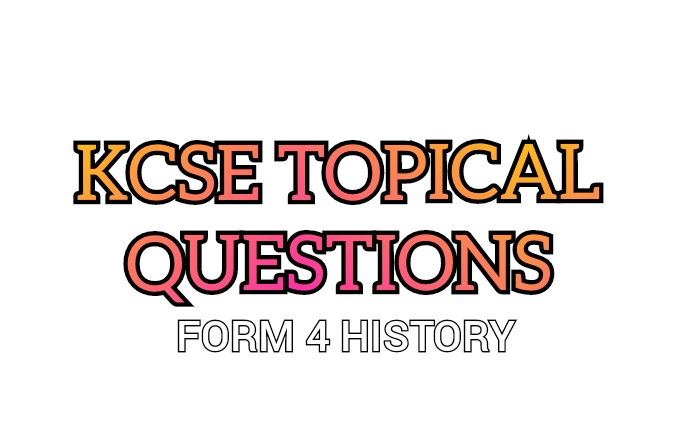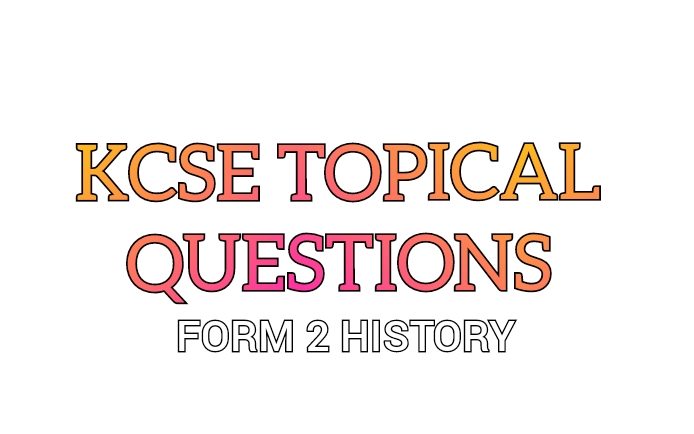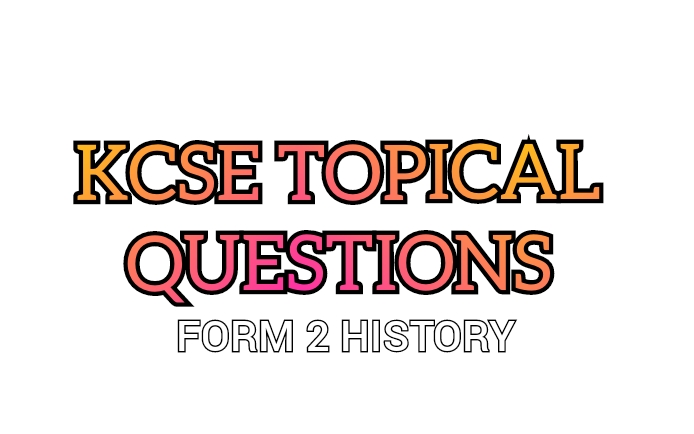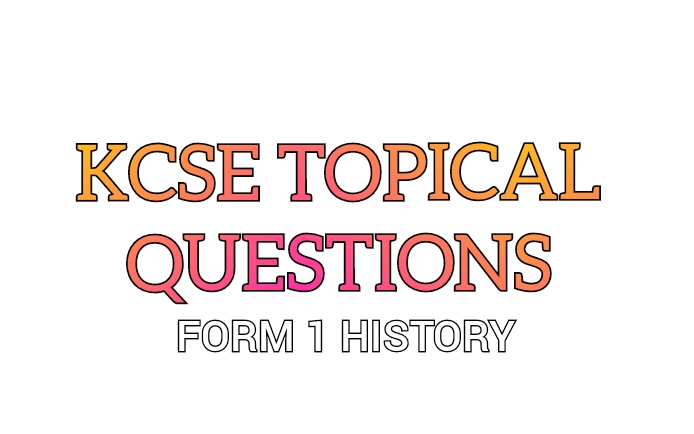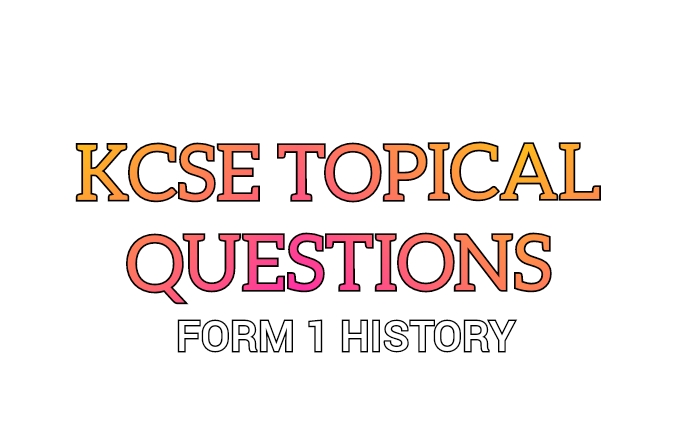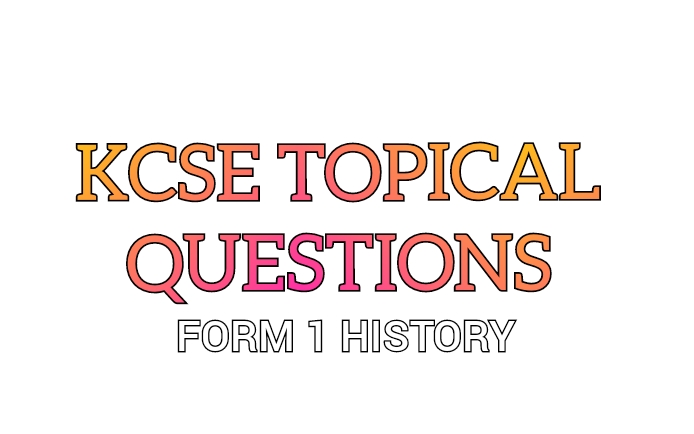Form 3 History Topical Questions : THE FORMATION, STRUCTURE AND FUNCTIONS OF THE GOVERNMENT OF KENYA
CHAPTER EIGHT: THE FORMATION, STRUCTURE AND FUNCTIONS OF THE GOVERNMENT OF KENYA 1) Identify three arms of government in Kenya. 2) Mention the function of the legislature. 3) Mention the function of executive. 4) Mention the function of the judiciary. 5) Who organizes and supervises elections in Kenya? 6) State the methods of elections that have been used in Kenya. 7) Give two classifications of elections in Kenya. 8) Define a by-election. 9) State the circumstances that may lead to a by-election 10) Give four types of the elections. 11) State an example of a party election in Kenya. 12) State the reasons for elections. For marking schemes and other forms topical question and answers inbox 0724351706 13) Mention some of the issues and needs of people that the elected members in the government should address. 14) What happens when a president dies while in office? 15) Discuss the laws that regulate elections in Kenya. 16) Mention the election offences contained in the Election Offences Act. 17) State the circumstances under which a person is not eligible for appointment as a member of the IEBC. 18) State the composition of IEBC. 19) State the functions of the IEBC in Kenya. 20)How many constituencies are there in Kenya? 21) Explain the delimitation of electoral units. 22) State the factors put into consideration in determining the number of inhabitants in a constituency. 23) State the factors to put into consideration in the reviewing of constituency and ward boundaries. 24) State the principles that every political party is mandated to observe. 25) List the prohibitions of a political party. 26) Mention the positions that are elected / filled during a general election in Kenya. 27) States the most popular method of elections in Kenya. 28) Define a general election. 29) When should general elections be conducted in Kenya according to the constitution? 30)Name two commissions established to investigate the 2007 general elections. 31) Mention the weaknesses and flaws of the 2007 general elections. 32) State the principles of the electoral system in Kenya according to the Constitution. 33) Mention the characteristics of free and fair elections. 34) Define voter education. 35) Explain what voter education entails. 36) Define civic education. 37) Explain what civic education entails. 38) State the conditions that a voter must fulfill in order to be registered. 39)Name the commissions that have conducted and supervised elections and referenda in Kenya. 40) Identify two categories of candidates for electoral posts. 41) State two levels at which party candidates are selected to vie for various seats. 42) State the qualifications for election for a member of County Assembly. 43) State the circumstances under which a person is disqualified from county elections position. 44) Explain the requirements for parliamentary candidates. 45) State the circumstances under which one is disqualified for election as a member of the National Assembly. 46) Explain the circumstances under which a Member of Parliament may lose his / her seat in Parliament. 47) State the qualifications for nomination as a Presidential candidate. For marking schemes and other forms topical question and answers inbox 0724351706 48) State the circumstances under which one is not qualified for presidential candidate nominations. 49) State the conditions that a candidate must fulfill in order to be declared as an elected president. 50) Who swears in the president elect? 51) State the qualifications for one to contest as an independent candidate. 52) Mention the importance of election campaigns. 53)Name the place where voting is done on the actual election date. 54) State the factors that undermine free and fair elections. 55) Mention different ways of ensuring that elections are free and fair. 56) Mention the steps of the electoral process in Kenya. 57) Mention one requirement one must have in order to vote during an election. 58) Identify two categories of candidates during an election. 59) Mention the guidelines and regulations for successful voting process. 60) State the mechanisms established for timely settling of election disputes. 61) Name the election officials. 62) Explain the duty of a returning officer. 63) Explain the duties of the presiding officer. 64) State the duty of the polling clerks on the polling day. 65) State the duty of security personnel on the polling day 66) State the duty of counting clerks on the polling day. 67) State one duty of party agents on polling day. 68) 69.State the duty of observers on the polling day. 69) 70.State one requirement of observers on the polling day. 70) 71.Name the election official in charge of a polling station. 71) Name the election official in charge of elections in a constituency. 72) 73.Name the election officials responsible for election matters at the district level. 73) 74.Who is responsible for swearing in the president elect into office? 74) 75.Identify the arm of government that is not affected by the general elections. 75) 76.Who is the head of the executive arm of government? 76) Give the two arms of the county government. 77) Mention the tasks of a government. 78) State the membership of county governments. 79) Mention the members of the county executive committee. 80) Mention the circumstances under which a county governor may be removed from office. 81) Mention circumstances under which the office of the county governor may fall vacant. 82) Who acts as the county governor in case of a vacancy in the office of the county governor and that of the deputy governor? 83) State the functions of county executive committee. For marking schemes and other forms topical question and answers inbox 0724351706 84) Mention the members of the county assembly. 85)Name the ex-officio member of the county assembly. 86) State the qualifications for election as member of county assembly. 87) State the circumstances under which one is disqualified from being elected as a member of the county assembly. 88) State the circumstances under which the office of a member of county assembly is declared vacant. 89) State the function of the speaker of the county assembly. 90) State the composition of the legislature. 91) Identify the lower house of the legislature. 92) Identify the upper house of the legislature. 93) Mention the membership / composition of the National Assembly. 94) Mention the members / composition of the Senate. 95) State the official languages of the Kenyan Parliament. 96)Name the officers of Parliament. 97) State circumstances under which the office of the speaker or the deputy speaker becomes vacant. 98) Mention the function of the speaker of the Parliament. 99) Give the names of speakers of Parliament since independence. 100) Explain the duties of the speaker. 101) Mention the duties of the majority and minority party leaders in the Parliament. 102) Discuss the functions of Parliament / legislature. 103) Explain the function of the National Assembly. 104) State the functions of the Senate. 105) Identify two special interest groups. . 106) Define a bill. 107) Give classification / types of bills. 108) Explain public bills 109) Explain private members bills 110) Who introduces government bills? 111) Who introduces Private Members' Bills? 112) List the components of money bill. 113) Where is a bill drafted? 114) Give the name given to the government draftsman of Bill. 115) Mention the origin of a bill concerning the county government. 116) Explain the stages in the lawmaking process. 117) Who submits a bill to the president for presidential assent? The speaker 118) Give the meaning of ‘Parliament supremacy’. For marking schemes and other forms topical question and answers inbox 0724351706 119) State ways in which Parliamentary supremacy is exercised. 120) Describe the limitations of parliamentary supremacy. 121) Mention the merits of parliamentary supremacy. 122) Explain the demerits of parliamentary supremacy. 123) State the composition of the executive arm of government. 124) Explain the principle of universal suffrage. 125) Why is election of the president in Kenya important? 126) Discuss the powers and functions of the president. 127) Name the people nominated by the president. 128) Name the people appointed by the president. 129) State the functions of the deputy president. 130) State the composition of the cabinet. 131) State the functions of the cabinet secretaries. 132) 133. Mention the responsibilities of the secretary to the cabinet. 133) State the general functions of the cabinet. 134) Highlight the functions of Principal Secretaries. . 135) Who approves the nomination of the attorney general? 136) What are the functions of the Attorney General? 137) What is the term of the Director of Public Prosecutions to hold office? 138) Explain the functions and powers of the Director of Public Prosecutions. 139) Identify the non-political section of the Executive arm of the government. 140) Highlight the functions of Public Service. 141) Identify the values and principles of public service. 142) State the functions and powers of the Public Service Commission. 143) State the principles that promote and guarantee national security in Kenya. 144) Name the members of National Security Council (NSC) President. 145) Mention the organs of the national security. 146) State the primary function of the organs of national security. 147) Mention the composition of the defense forces. 148) Give the composition of the Kenya Defense Forces. 149) Identify the main function of the Kenya Defense Forces. 150) Discuss the functions of Kenya Defense Forces. 151) Mention the composition of the defense council. 152) State the function of the defense council. 153) Discuss the challenges facing Kenya Defense Forces. For marking schemes and other forms topical question and answers inbox 0724351706 154) State the functions of National Intelligence Service. 155) Discuss the challenges facing the National Intelligence Service. 156) 158. Identify the composition of the National Police Service. 157) Who is the head of the National Police Service? 158) Mention the units of the Kenya Police Service. 159) State the functions of the National Police Service. 160) Mention the duty of National Police Service in safeguarding lives on roads. 161) State the challenges facing the National Police Service. 162) State the functions of the National Police Service Commission. 163) Mention the measures taken by the national security organs to improve their services. 164) What are correctional services? 165) Who offerscorrectional services? 166) Explain the functions of correctional services 167) State the challenges facing correctional services. 168) Highlight the reforms undertaken to improve conditions of correctional services. 169) Highlight the principles guiding courts and tribunals. 170) State the methods used to grade courts in Kenya. 171) Define jurisdiction. 172) Give two types of jurisdiction 173) Explain original jurisdiction. 174) Who is the head of the judiciary in Kenya? Chief Justice 175) Who is the deputy head of Judiciary? 176) Give the name of the chief administrator and accounting officer of the Judiciary. 177) State the composition of the Judiciary. 178) Give two categories of courts in Kenya. 179) Give examples of superior courts in Kenya. 180) Give examples of subordinate courts in Kenya. 181) Name the highest court in Kenya's judicial structure and Court system. 182) Who constitutes the Supreme Court? 183) Who is the President of the Supreme Court? Chief Justice. 184) Who is the vice president of the Supreme Court? Deputy Chief Justice. 185) Highlight the qualification for appointment to the Supreme Court. 186) State the functions of the Supreme Court 187) Name the second highest court in the Kenyan judiciary system. Who recommends the appointment of the judges of Court of Appeal? 188) Mention the qualifications required for appointment as a judge of Court of Appeal. 189) State the functions of the Court of Appeal. 190) Name the third highest Court in Kenya. 191) State the qualifications for appointment as a judge of the High Court. 192) State the functions of the High Court. For marking schemes and other forms topical question and answers inbox 0724351706 193) Mention the courts with appellate jurisdiction. . 194) Highlight the factors that may lead to the removal of a judge from office. 195) Mention the cases handled by the magistrate courts. 196) State the objectives of sentencing a person who has broken the law. 197) Mention the qualifications for appointment in the office of Kadhi Courts. 198) Mention the cases under the jurisdiction of Kadhis' Courts. 199) Give the name given to the military courts. The court martial. 200) Give examples of tribunals in Kenya. 201) Mention the cases tried by court martial. 202) Identify the body that promotes and facilitates the independence and accountability of the Judiciary. 203) Highlight the functions ofJudicial Service Commission. 204) State the functions of Chief Justice. 205) State ways in which the independence of the Judiciary in Kenya is guaranteed. 206) Discuss the challenges facing the Judiciary. 207) Mention the reforms that have been undertaken to improve the performance of the judiciary. 208) Give the meaning of ‘Rule of law’. 209) State ways in which the rule of law is upheld in Kenya. 210) State the elements of rule of law. 211) State the principles of the rule of law. 212) State the importance of the rule of law. 213) What is natural justice? 214) Explain the principle of right to fair hearing. 215) Give two rules that govern natural Justice. 216) Give ways in which the concept of natural justice is held in Kenya.
 KCSE Revision Zone
KCSE Revision Zone

